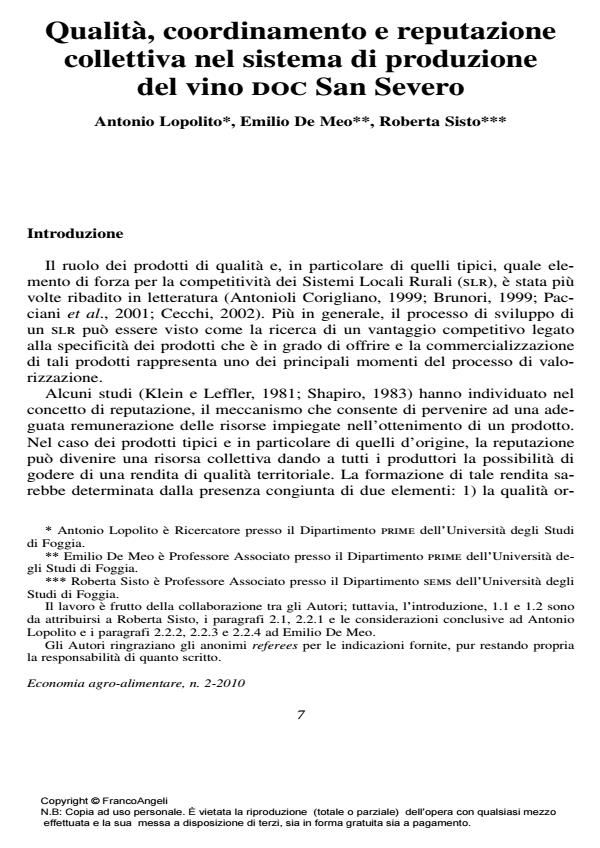Quality, coordination and collective reputation in the San Severo wine production system
Journal title ECONOMIA AGRO-ALIMENTARE
Author/s Antonio Lopolito, Emilio De Meo, Roberta Sisto
Publishing Year 2011 Issue 2010/2
Language Italian Pages 16 P. 7-22 File size 396 KB
DOI 10.3280/ECAG2010-002002
DOI is like a bar code for intellectual property: to have more infomation
click here
Below, you can see the article first page
If you want to buy this article in PDF format, you can do it, following the instructions to buy download credits

FrancoAngeli is member of Publishers International Linking Association, Inc (PILA), a not-for-profit association which run the CrossRef service enabling links to and from online scholarly content.
The relevance of quality and typical food as strength for Rural Local Systems (rls) is widely recognized in literature (Antonioli Corigliano, 1999; Brunori, 1999; Pacciani et al., 2001; Cecchi, 2002). Generally speaking, the chance of a rls to build a competitive advantage often depends on the specificities of food-products that the system as a whole is able to supply. The commercialization of such products represents a crucial step in the valorization process. Several studies (Klein and Leffler, 1981; Shapiro, 1983) find in the reputation of products the element which makes possible suitable levels of returns on resources used in the production process. For typical food, the reputation has public goods characteristics, indeed, it can generate a territorial quality surplus and so it is known as collective reputation. Such surplus is based on two elements: 1) the specific quality of products and 2) the level of coordination of the production system. In order to face the risk of opportunistic use of collective reputation, States have generated a series of laws for formal protection of denominations. Among these normative tools, an important role is played by the Origin Denomination (od). The main function of such tool is to give juridical protection to the name that a product has got in the market by its typicalness and its link with the territory. Therefore the od can be considered as an institutional process whose goal is the reproduction and the conservation of collective reputation of a typical product. In the light of these considerations, the aim of this paper is twofold: verify the contribution of a specific od, the San Severo wine, in generating the reputation surplus for its production system and investigate on its determinants. In particular, the study of the product’s quality and coordination level lead to define the production system as a whole in terms of collective reputation. Then we compare such characteristic with the currently level of reputation enjoyed by the San Severo wine denomination. The data have been collected through a direct survey by the means of questionnaires submitted to local actors and interviews to important witnesses in order to have better grip on the historical and characterizing aspects of the system. In the section 1 we show the theoretical approaches to individual and collective reputation and their relation with od. Then (section 2) we illustrate the study case and the research outcomes. Finally, we dedicate the last section to some conclusive observation and suggest for further research.
Keywords: collective reputation, quality, coordination, origin denomination
Jel codes: L14, L15, Q13
Antonio Lopolito, Emilio De Meo, Roberta Sisto, Qualità, coordinamento e reputazione collettiva nel sistema di produzione del vino doc San Severo in "ECONOMIA AGRO-ALIMENTARE" 2/2010, pp 7-22, DOI: 10.3280/ECAG2010-002002